There’s an undeniable creative magnetism to Asheville—from George Vanderbilt’s visit in the 1880s that convinced him to build one of America’s greatest estates (Biltmore House) to the 1933 founding of the seminal Black Mountain College (home to luminaries in the world of art, architecture, music, and dance), the mountains of western North Carolina have been a draw for those in search of space to do something a bit different.
It’s no surprise, then, that _Rolling Stone Magazine _named Asheville the “new freak capital of the U.S.” in 2000. A haven for art galleries, independent bookstores, musicians, locavore restaurants, farmer’s markets, and the like, it’s equally no surprise that craft beer took hold of the city in a serious way in the 2000s and is poised to play an even larger role in the city’s future.
Not One, But Three Major Satellites
For most cities, having one major national craft brewer locate a new brewery within your boundaries would be a big deal (just look at the number of cities that bid for Stone Brewing Company’s East Coast expansion brewery). Asheville, however, currently boasts two major satellite breweries—Sierra Nevada’s Mills River facility just south of Asheville proper and Oskar Blues’s location a bit further south in Brevard, North Carolina. A third major brewery, Fort Collins–based New Belgium, will open less than a mile from central downtown in late 2015. With almost two million barrels of brewing capacity coming online in less than two years, Asheville is—undoubtedly—the fastest growing craft-beer city in America.
Sierra Nevada’s decision was driven by a number of factors. Sales were booming in the eastern United States, so it made sense to build an East Coast brewery “to bring beer to the market fresher with less of an environmental impact,” says Sierra Nevada Beer Ambassador Bill Manley. “Once we decided to go east, there was a quantifiable list of things we needed in a new city—access to good water, ease of shipping and access to highways, things like that. And then there were the cultural intangibles,” such as access to the outdoors, good schools, and even live music. It also meant local recycling programs and efforts toward alternate energy production, among other sustainability efforts.
There was a final cultural intangible to check off the list as well: the city’s local beer scene. Like Chico, Sierra Nevada’s new community needed to embrace its local brewers—especially the new kids on the block.
“We really didn’t want to put it in the backyard of another brewer, so we flew out and met with the Asheville Brewers Alliance (ABA) and told them what we wanted to do,” Manley explains. “They welcomed us here from the get-go, and their blessing was the last bit of incentive we needed.”
That spirit of camaraderie led Sierra Nevada to choose the ABA as one of its collaboration partners for their Beer Camp 12-pack last summer—Tater Ridge Scottish Ale was created with the help of twenty-eight craft breweries in Asheville and its surrounding area.
“Sierra Nevada was vocal and intentional about becoming a part of the Asheville community,” says Luke Dickinson, the head brewer at Wicked Weed Brewing. Dickinson and John Stuart of Green Man Brewery were the two representatives of the ABA who brewed the Beer Camp collaboration with Sierra Nevada.
“Asheville is a funky place. We wanted the beer to be unique to our region, where traditionally Scottish settlers came to live,” explains Dickinson. So he, Stuart, and the brewers at Sierra Nevada wrote the recipe for the Tater Ridge, a beer brewed with North Carolina’s state vegetable: the sweet potato. Local craft maltster Riverbend Malt House provided some of the grain.
“Our beer tastes better when we collaborate,” says Jennifer McLucas, the director of the ABA. “That dedication to collaboration is evident at our breweries.”
To Each His Niche
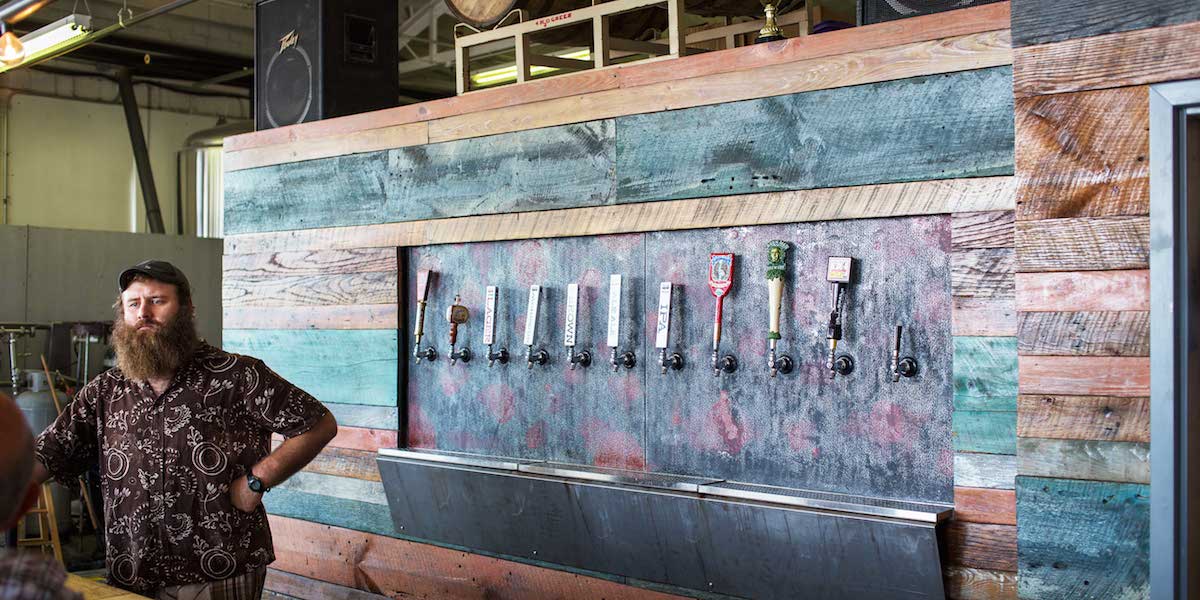
Overlap is to be expected in a town with almost 90,000 people and nineteen breweries and counting, but Asheville’s beer makers still manage to distinguish themselves. “Everybody has carved out their own niche, which means there’s always something that’s new and exciting,” Manley continues. Among Asheville’s brewing companies are the globally inspired nanobrewery One World Brewing, the carnival-themed Hi-Wire Brewing (pictured above), and the speakeasy-style brewpub Altamont Brewing. There’s also Asheville Brewing Company, where guests can dry hop their own pints at a hops-infusion bar or watch a movie in the dine-in theater, and Oyster House Brewing Company, a seafood restaurant that makes its own beer and specializes in—you guessed it, oyster stout.
South Slope, a neighborhood just south of Asheville’s downtown, is quickly becoming the city’s unofficial beer district. Here beer drinkers can find Green Man Brewery, Asheville’s second brewery that opened just a few years after Highland Brewery in 1997, and Burial Beer Co. (pictured at top), a company focused on Belgian-style ales that’s building an urban farm and beer garden that will open in spring of 2015. When Catawba Brewing, a craft brewery based in Morganton, North Carolina, recently announced its plans to expand into Asheville, it became the eighth brewery to take space in South Slope.
One of those eight breweries is Wicked Weed Brewing, which opened next to Orange Peel, Asheville’s largest music venue, in 2012. The brewpub has been noted for its large variety of beer styles, including hoppy West Coast ales and barrel-aged beers. Wicked Weed has also carved out its niche with the development of a sour-and-wild brewhouse and production facility called the Funkatorium. This tasting room is the first and only sour-and-wild-dedicated tasting room in the southeastern United States with 500+ barrels that will hold the brewery’s lambic-style ales. The Funkatorium’s sixteen taps and two hand pumps feature sour and farmhouse-style ales such as the flagship Black Angel Cherry Sour and the Oblivion Sour Red Ale, brewed with blackberries and dried dates. Their wild ales aren’t just impressing the locals; the 100 percent Brettanomyces-fermented Serenity wild ale has garnered both a GABF gold medal and major accolades from the beer press.
Wicked Weed is also the first brewery in town to produce gluten-free beer and is often noted for its farm-fresh brewpub menu. It is perhaps the quintessential Asheville brewery—founded by experimental homebrewers, dedicated to locally sourced, high-quality ingredients, and intricately connected to its surrounding community.
Find more great beer destinations in every issue of Craft Beer & Brewing Magazine®. Subscribe today!
Eating is an agricultural act,” says Riverbend Malt House’s Co-owner Brent Manning. “I always say drinking is as well. There’s a big push in the beer here for quality and sustainability. It’s great to see everyone wrapping their arms around it.”
Beyond the Breweries
“In Asheville, you go into a place that you would think would be a shot-and-a-beer type of tavern, and there are eight or ten craft-beer handles and not a macrobrew in the house,” says Sierra Nevada Beer Ambassador Bill Manley. “Hole-in-the-wall joints, not the usual suspects when it comes to craft beer, and that goes for on-premise stores, too,” he continues. “There are amazing craft selections in gas stations. It’s hard to not find good beer here.”
Check out these Asheville watering holes, restaurants, and specialty stores for rare beer lists, fresh bar concepts, and unforgettable ambiance.
Pour Taproom
800 Haywood Road
Asheville boasts the world’s largest self-pour bar. Opened in the summer of 2014, Pour Taproom is a pour-your-own tasting room in West Asheville, with beer available by the ounce.
The Thirsty Monk
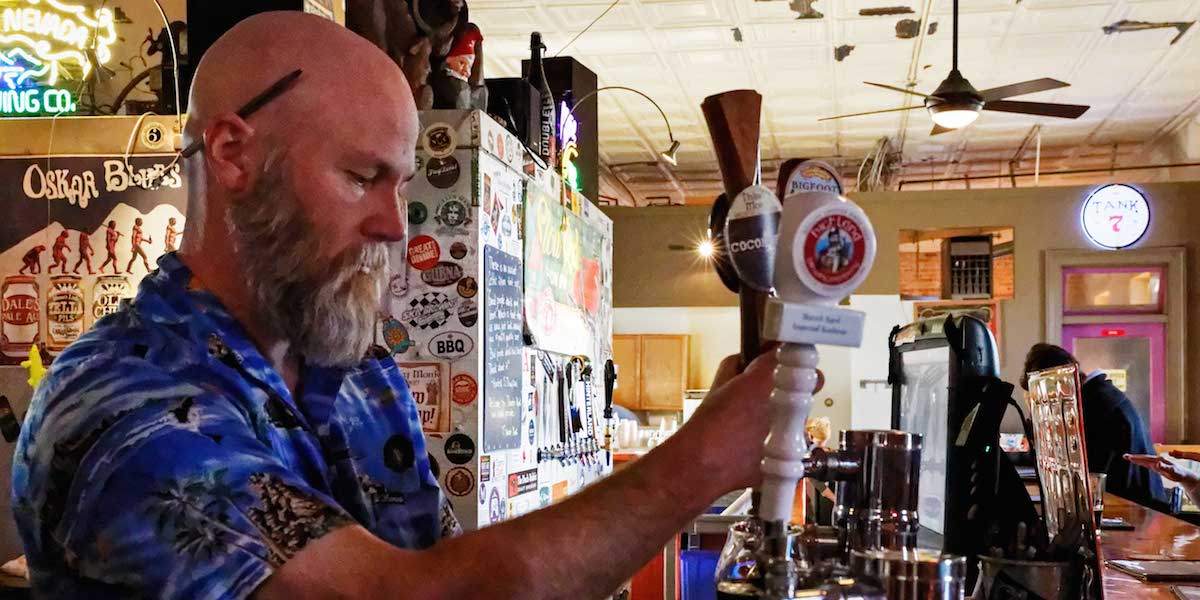
92 Patton Avenue
This famous pub is often noted as one of the finest beer bars on the planet, where guests can sample a wide array of rare craft beers. In addition to The Thirsty Monk’s downtown Asheville location, the company has expanded to include two more pubs on the south and north sides of Asheville: the Top of the Monk cocktail bar and Open Brewing, where homebrewers can brew and serve their beer on draft.
Pack’s Tavern
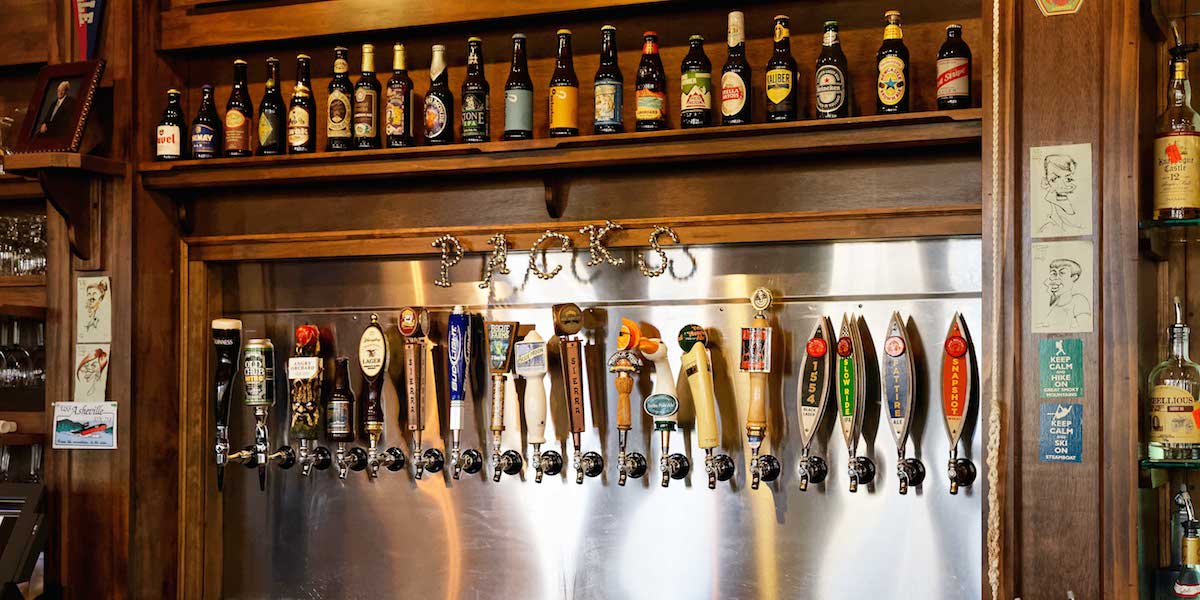
20 South Spruce Street
This quintessential downtown pub sits in one of Asheville’s more historic buildings in Pack Square Park. Pack’s boasts an outdoor patio perfect for sipping its large selection of local drafts on tap.
The Bier Garden
46 Haywood Street
Head to historic Haywood Street in downtown Asheville for one of western North Carolina’s best beer selections. The Bier Garden has more than 200 beers on draft and in bottles.
Universal Joint
784 Haywood Road
This bar makes you feel as if you were hanging out in your own backyard with the perk of daily rotating drafts.
Jack of the Wood
95 Patton Avenue
Home to the original Green Man Brewery, Jack of the Wood is a Celtic-style tavern that still offers the brewery’s lineup of English-style beers to complement its made-from-scratch pub menu.
Root Bar
1410 Tunnel Road
Nothing says more about a town than its dive bars. This one sports a local craft-beer lineup and a dedicated yard for root ball (a combination of bocce ball and horseshoes).
Bruisin’ Ales
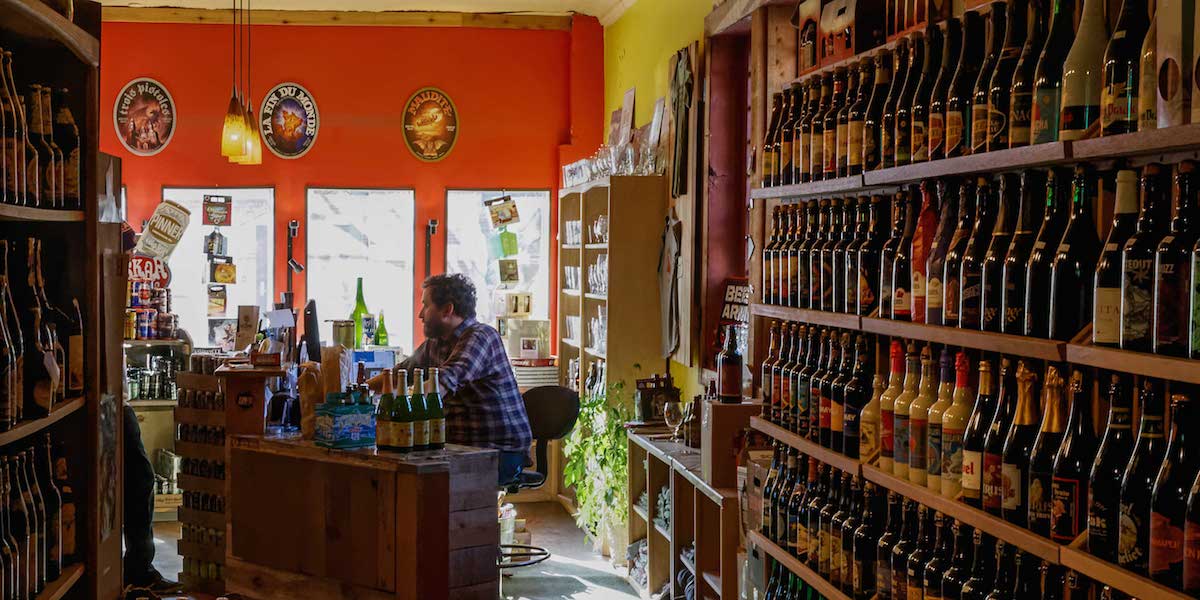
66 Broadway Street
The first dedicated beer store in Asheville opened downtown on Broadway Street in 2006. This shop stocks more than 1,000 labels from around the globe.
Hops & Vines
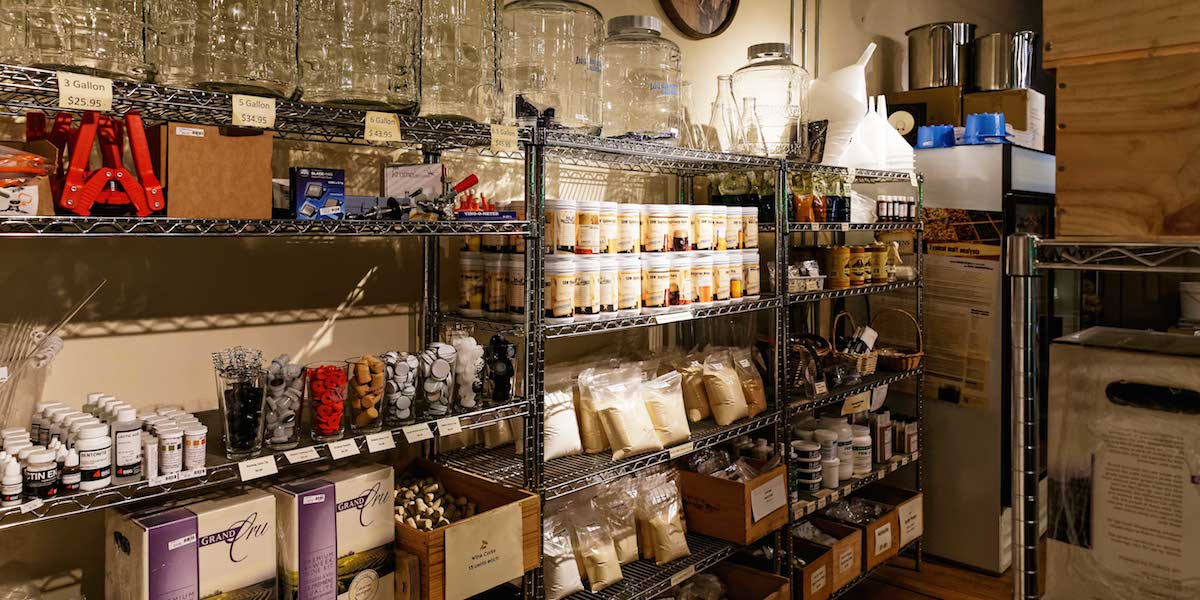
797 Haywood Road, Suite 100
Hops & Vines, part homebrew-supply shop and part boutique liquor store, hosts weekly tastings and homebrew classes.
12 Bones Smokehouse
5 Riverside Drive
No trip to the South is complete without finger-lickin’ barbecue, and here is some of North Carolina’s best. This casual, lunch-only restaurant sells smoked meat by the pound and local beer on draft.
Farther Out
Forty-five minutes south of Asheville, in tiny Brevard, North Carolina, lies the East Coast outpost for Lyons, Colorado-based Oskar Blues Brewery. It’s no accident that the brewery is sited in close proximity to the mountain biking meccas of Pisgah National Forest and DuPont State Forest (the brewery even has its own in-house bike brand, REEB). In Colorado, Oskar Blues operates the Hogs & Heifers farm to close the loop on organic and natural ingredients for its brewpubs and restaurants. To that same end, last year it purchased a 145-acre farm in Brevard that will give it space to grow hops, raise cattle fed on its own spent grain, and operate a bike park destination with trail access directly into DuPont State Forest.
